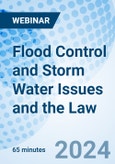Learn how the increasing importance of stormwater and flooding programs creates new responsibilities and opportunities.
The major and growing risks of stormwater and flooding to cities, transportation systems, people, and the environment are leading to difficult decisions by public agencies. Flooding is the major cause of property damage in the U.S., and recent catastrophic events like atmospheric rivers and hurricanes Harvey, Irma, Sandy and Katrina have raised losses to unprecedented levels. Stormwater management requires the organization of public utilities and responses to rain tax politics, consent orders, and demands for green infrastructure. In response to increasing damages, liability, and climate change, a new legal environment has evolved from statutes and cases. Recent high-profile cases go beyond torts to involve takings litigation under the Fifth Amendment to the Constitution. Changes are coming to the National Flood Insurance Program, which has required federal bailouts. Local government responsibilities must be financed by ratepayers, which causes rate shock in some cases. Homeowners are often in a quandary about their risks and losses. Learn how the increasing importance of stormwater and flooding programs creates new responsibilities and opportunities. The legal aspects of stormwater and flooding will be explained through doctrines, statutes, and cases. Major issues of floodplain mapping and programs, combined sewer overflows, and challenges of stormwater utilities will be explained. A detailed explanation of the National Flood Insurance Program will be provided, including its payouts, revenues, and challenges. Recent court decisions will be reviewed, and you will be alerted to how stakeholders should respond to future issues.
Learning Objectives
- You will be able to define types of floods, likely damage scenarios, and flood data that enables you to understand the National Flood Insurance Program.
- You will be able to discuss risk analysis methods such as flood forecasting and dam safety models and how hydrologic analysis is used to predict flood risks under nonstationary climates and floodplain hydraulics are analyzed
- You will be able to recognize economic, social, and environmental flood risks.
- You will be able to review legal and policy frameworks of flooding and stormwater programs and litigation.
Agenda
Speakers

Professor Neil S. Grigg,
Colorado State University- Teaches graduate courses in pipeline engineering and hydraulics, infrastructure and utility management, and water resources management at Colorado State University
- Investigator of Water Research Foundation projects on water distribution systems
- Author of Water and Sewer Infrastructure Management, 2012, CRC Press/Lewis Publishers
- Former environmental regulator and director of two state water research institutes
- Former consulting engineer and principal of Sellards & Grigg Inc. in Denver
- Life member of the American Society of Civil Engineers, American Water Works Association and American Public Works Association
- Ph.D. degree in hydraulic engineering, Colorado State; M.S. degree in hydraulic/structural engineering, Auburn University; B.S. degree in engineering, U.S. Military Academy
- Can be contacted at 970-491-3369 or neilg@engr.colostate.edu
Who Should Attend
This live webinar is designed for engineers, public works and utilities directors, government officials, planners, construction and project managers, presidents, vice presidents, business owners and managers, environmental professionals, developers, surveyors, contractors, attorneys, and architects.









